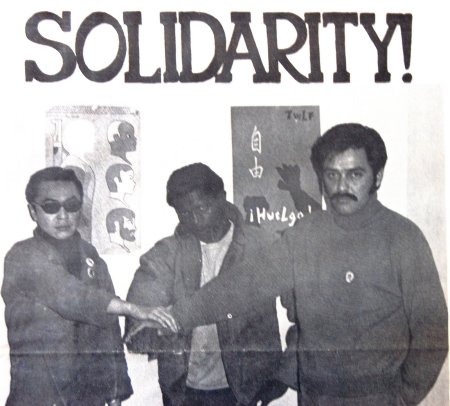In many significant events, Asian Pacific Islander
Americans have little to no recognition in their contributions. The reading and
documentary reveal the legacies, lessons, and effects of the contradicting
stereotypical images of Asian Americans, especially those who have served in the
war.
In the reading About Face: Recognizing Asian
& Pacific American Vietnam Veterans in Asian American Studies by Peter
Nien-Chu Kiang, various issues regarding these veterans arise from the often
censored or unpublished primary and secondary sources.
There was a strong connection felt with other
soldiers of color especially with African Americans as both groups have
experienced racism in the military. The solidarities that were established between
veterans of color on the battlefield were transplanted to the United States. As
a result of all the stresses from the Vietnam War stemming from racism in the
military, war experience in general against their “Third World brothers”, and
the internal conflicts regarding the morality upwards of 30.6% of all male and
26.9% of all female Vietnam theater veterans have at one point suffered from
Post Traumatic Stress Disorder. The war that was thought to bring peace and anti-Communism
has created interracial separation and detrimental effects as well.
In the documentary Aoki, ethnic solidarity seemed highly prevalent for community
mobility. Richard Aoki, who was a well-recognized Asian American figure and a
member of the Black Panther Party, was a huge civil rights activist and a
leader in our community. His views of the United States institutional systems
has created much controversy within the American society, however unlike many
Asian Americans, he voiced his opinions without fear and what he believed was
right. He was a radical Asian American leader who brought voice to communities
and gathered them together.
At a young age, Richard had experienced
American “prison” known to many as the Japanese concentration camp and served
time in the military which gave him an unexpected, peculiar view of the
American society. The documentary talked about how the police were using soldiers,
like Richard, as tools to “utilize and murder” others such as in the Vietnam
War. This made him want to speak up for what was just and serve as a voice on
behalf of his communities. His straight-forward, unfiltered dictation gave a sense
of gathering among the people as he was honest about his thoughts. Having gone
through a war-time decade, he left a legacy as “the baddest Oriental in West
Oakland” and was a well-known figure within the bay area. Everywhere he went,
his demeanor was well respected and no one questioned his presence. That was a
figure worth representing for our Asian American community and ethnic
solidarity.

The sharing of these experiences add to our understanding of the historic
relationship between the legacy of war in Asia and American views of Asians as
the enemy which is by the forced annexation of the Philippines, the Korean War, etc. The lessons learned have
left a legacy of more critically thinking Asian & Pacific American
communities who have since then more intensely fought for more recognition and
entitlements to their rights. This has been done by both veterans and the
communities in general, as all have experienced marginalization because of their
identity as Asian and Pacific Americans. This recognized inequality is still
being fought for today until the democracy that this country promises is made a
reality.
Documentary:
“Aoki,” Directors Mike Cheng and Ben Wang (2009).
Kiang, Peter,
“About Face: Recognizing Asian & Pacific American: Vietnam Veterans in
Asian American Studies.”
N.d. Basicnews.ca.
Web. 03 May 2014.
<http://basicsnews.ca/2012/09/richard-aoki-and-the-new-snitch-jacketing/>.
N.d. Word
Press. Web. 03 May 2014. <https://churlsgonewild.wordpress.com/2011/11/>.
1) What are the pros and cons of ethnic solidarity across
different communities? How can we use it to mobilize?
2) How is it different in community organizing in the past vs.
today? Show some examples.
3) What are some of the post-war effects on the soldiers who
served in the military? How about the effects it had on their families
(Amerasian families, families back home, etc)?
4) What are some overlook aspects of the Vietnam War veterans
and families affected by the Vietnam War?
5) How can you
now interpret war and the real reason why we have war, such as the Vietnam War?
By: Claudine Sanchez and Teresa Tran
By: Claudine Sanchez and Teresa Tran

No comments:
Post a Comment